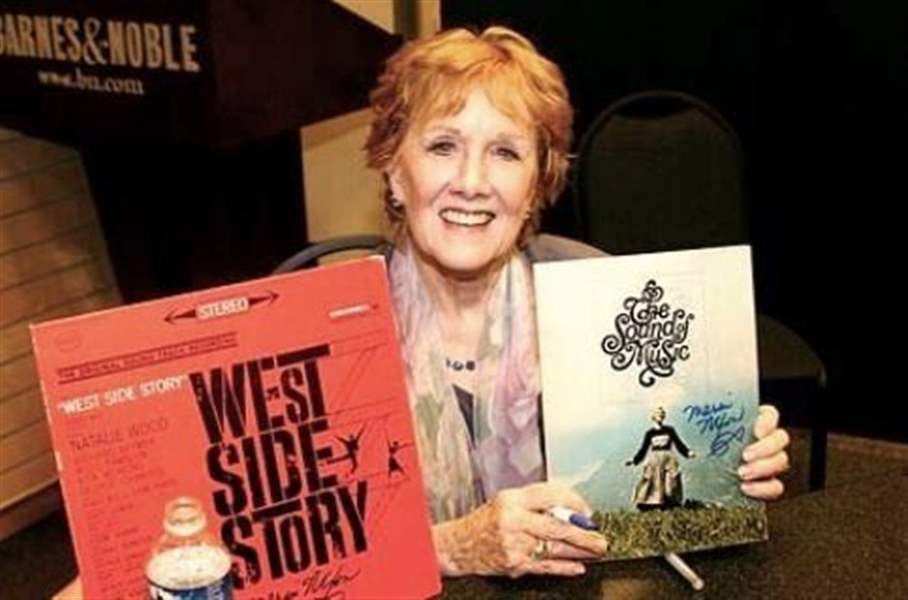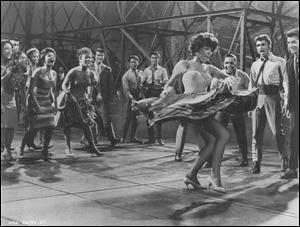
Marni Nixon, voice behind stars, now heard
6/16/2013
Marni Nixon holds album covers from ‘West Side Story’ and ‘Sound of Music, two of the productions on which she worked.

Marni Nixon holds album covers from ‘West Side Story’ and ‘Sound of Music, two of the productions on which she worked.
Long before another Nixon got mixed up with a secret recording in Washington, Marni Nixon was one of the best-loved voices nobody knew.
While stars such as Deborah Kerr, Audrey Hepburn, and Natalie Wood received the applause and record royalties for their work in musicals such as The King and I, My Fair Lady, and West Side Story, it was Nixon’s soprano who sang their songs uncredited, often after signing a contract never to disclose the ruse.
Years ago, the secret got out and Nixon became kind of a byword for behind-the-scenes vocal stand-ins, of the type that is used less today. But they still are used, says Nixon, 83. “They just have a cleverer way to do it.”
Nixon says that when she began working in Hollywood as a child actor in 1937, it was common for singers to dub stars’ voices, just as stunt men would come in to do their physical stuff. It’s just that the vocal stand-ins, who played a much bigger role in creating a character, were never credited and were largely kept secret.
“It was just a part of the working singer’s job in Hollywood to do anything that was necessary and a lot of dubbing was going on,” she says. To subsidize a classical career that had her eventually singing for Stravinsky and Schoenberg, “you just worked any way you can.”
RELATED ARTICLE: Some famous musical fakes
After inserting her soprano to help Marilyn Monroe reach the high notes in Diamonds Are a Girl’s Best Friend and lending her voice for stars such as Janet Leigh and Margaret O’Brien, she got a call to do all of Kerr’s singing in the musical The King and I when the star’s regular vocal stand-in died unexpectedly.
Despite having only a month to prepare, Nixon worked closely with Kerr to present the perfect screen illusion.
“There was no book, nobody could tell you how to do to this dubbing,” Nixon says. “She wanted to also look like she was really singing and wanted to be using the same muscles and the same stretches you do in expressions.”
Nixon would try to stretch her neck the same way as Kerr and alter the shape of her mouth to emulate that of the actress. “Just an intuitive kind of response, I guess,” she says. “I think I learned more about acting from observing her in that way. To imagine what was going on in her mind that would create that kind of sound and the flow of the emotionality that was going through her when she was singing.”

The 'West Side Story' soundtrack was a festival of overdubs, with the marquee stars doing scarcely any of the singing. Above, Rita Moreno dances during the Broadway production.
The collaborative process between marquee actress and the “ghost voice” behind the curtain was similar in another high-profile project, when she provided all the singing for Hepburn in My Fair Lady.
But when Nixon was hired to sing for Wood in West Side Story, Wood thought Nixon was brought in to fill in the occasional high notes.
“She didn’t know how much of her work would be done by somebody else,” Nixon says. “She didn’t know that it would all be thrown out and that it would be all my voice at that point.”
Nor did Wood think it had to be, she says.
“In the case of Audrey Hepburn, she was very smart and could say, ‘I know this is not good enough, I want to keep trying myself,’ but she had to accept that it wasn’t quite what it should be. But I don’t think that Natalie Wood’s ego could take that. Frankly, I think they used to create that kind of attitude too much — allowing them to have the illusion when they knew all along that she wasn’t good enough.”
As it turned out, Nixon was all over West Side Story. When Rita Moreno’s vocal stand-in, Betty Wand, was out sick one day, Nixon was asked to change her voice enough to sing her part of the “Tonight” harmonies — to distinguish from her voice also subbing for Wood.
“There were two different timbres of the voices that were there,” Nixon says. “It was hard to do that way, but it was fun, too.”
Beyond that, Nixon dubbed some of Wood’s lines as well.
“There was some dialogue at the very end where it was so emotional, but everyone was so tired of filming at that point they would get into giggling fits,” she says. “So when [Wood] went to record some of these emotional lines, it didn’t come off, so I had to come and redub some of that, too.”
The West Side Story soundtrack was a festival of overdubs, with the marquee stars doing scarcely any of the singing. Jimmy Bryant sang for Richard Beymer (Tony) and Tucker Smith for Russ Tamblyn (Riff).
“It was a very difficult score because it’s almost written like an opera, very complicated,” Nixon says.
She never received credit for any of her work on the film, although she did get royalties for the soundtrack.
“It was kind of unheard of at that point,” she says. “But I stuck to my guns.”
Credit also goes to composer Leonard Bernstein, who gave up a quarter percentage of his royalties so Nixon could be compensated for what turned out to be the best-selling album of the 1960s and the one with the longest run at No. 1 on the Billboard album charts — 54 weeks.
Nixon appeared as one of the singing nuns in The Sound of Music and can be heard as the grandmother in the animated Mulan.
She also went on to have concert success, toured for years with Liberace, and hosted Boomerang, a popular children’s television show in Seattle. (A son, Andrew Gold, who died in 2011, was a recording star in his own right, with the hit single “Lonely Boy” and the theme to TV’s Golden Girls, “Thank You for Being a Friend.”)
Nixon says she thinks those who do overdubs deserve onscreen credit like anybody else who helps create a product. And sometimes stars, who can’t be expected to be great singers as well as actors, frankly need the help.
Recent musicals such as Les Miserables that emphasize that the singing is actually done by the cast have “gone overboard,” she says.
“I must say that as far as Les Miz, certain people that they did hire were questionable vocally. I would have rather had it dubbed. In some places, it was too distracting.”